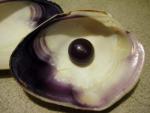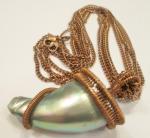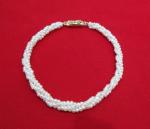Some Freshwater Mussels becoming Extinct?
Are freshwater mussels becoming extinct?
In 1891, a German immigrant founded a factory in Muscatine, Iowa that made mother-of-pearl buttons from freshwater mussels. As much as 1,800 pounds of mussels per day were removed from some rivers and over a period of six years, 750,000 pounds were removed from the Mississippi. Mussels were saved from this industry when plastic buttons became available. (Watters)
Now, in the last twenty years, tons of mussels are harvested for making pearl beads or nuclei, shipped overseas, and used to seed marine pearl oysters that will grow gems for the cultured pearls industry. Over harvesting threatens, and illegal collecting is on the increase. (Watters)
Good habitat for mussels is fresh flowing water. They require fish to complete their life cycle. They can tolerate natural levels of silt but can be suffocated by silt at the level being added by human activity including construction. Channelization makes the water flow too fast for mussels. Dams make water pool and stop the water from flowing fast enough. Water often carries chemical pollutants. Freshwater has been invaded by exotics such as zebra mussels that kill other freshwater mussels. Restoration is complicated by the fact that there are many facts about mussels that are still unknown. (Cummings)
Twenty-one of 300 species of North American mussels have become extinct according to Cummings. Sixty-two others are endangered and 77 are threatened. Mussels have a story to tell about what we have done to change the habitat for them and other living things in our country.
Pearl City is reported to have gotten its name from the pearls found in freshwater mussels in the creek. That could be fact. A Pearl Rush began in 1857 that started when a pearl was found in a mussel in a New Jersey stream and sold at Tiffany’s for $2,500. Everyone began searching for easy riches shucking every mussel to be found from New Jersey to the Rocky Mountains.
More about freshwater mussels becoming extinct?
Join in and write your own page! It's easy to do. How? Simply click here to return to Mollusc News.



